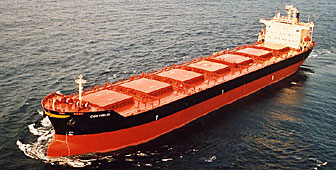Swiss role at sea makes waves in new book

The story of the merchant fleet, which helped keep landlocked Switzerland afloat during the Second World War, is told in a fascinating new book about the Swiss navy.
It relates how Basel developed as a flourishing port on the River Rhine to become the inland home port for seagoing Swiss cargo ships.
“Home Port Basel” describes how the sea-going Swiss navy was created out of necessity during the 1940s to ensure the delivery of vital food supplies and raw materials.
Its “home” port was then Lisbon because Portugal, like Switzerland, was neutral, says author Barbara Lüem.
“Theoretically, the neutrality was respected,” Lüem told swissinfo. “But mistakes were made by countries involved in the conflict and, on a number of occasions, Swiss vessels were attacked from the air and crew members killed.”
At its high point in 1952, the Swiss fleet consisted of 36 vessels. Although the total tonnage has been in decline for some years, Switzerland still ranks in second position among nations without a coastline.
North Sea link
Basel’s role in Switzerland’s naval history dates back to Roman times and the Middle Ages, when it was an important trading port 1,000 kilometres up the Rhine.
But it wasn’t until the early 20th century that it was launched as a link to the North Sea at Rotterdam and Antwerp.
“In 1903, a steamship reached Basel upriver from Strasbourg for the first time,” Lüem explains. “It was a historic occasion.”
One year later, the first barge – laden with coal and towed by a steamer – made what was the official maiden voyage along the same stretch of water.
Collisions
A photograph of the two vessels arriving at Basel is among the many visual highlights of this lavishly illustrated book, published in German by the Christoph Merian Verlag.
There are also pictures of the 10,000 ton Basilea, launched in 1952.
During its 26 years as the “flagship” of the Swiss fleet, the Basilea carried cargoes throughout the world, was involved in two serious collisions with other ships and ended up in a scrap yard in 1978.
Foreign trade
Today, there are fewer ships under the Swiss flag – and not all of them are Swiss-owned. The Swiss Seamen’s Association counts some 700 members, most of them skilled workers such as mechanics and carpenters.
However Lüem is convinced that Basel, whose four terminals currently handle about 15 per cent of Switzerland’s foreign trade, has a future as a port.
“Coal, grain, oil and iron and steel products are among non-perishable commodities ideally transported by water,” she said. “What the Swiss shipping industry needs is more political and public support, and of course, more subsidies.
“Sea and river traffic is still the cheapest and most environmentally-friendly means of transporting products in bulk.”
swissinfo, Richard Dawson
Switzerland today ranks second in the list of “maritime” nations without a coastline.
Basel’s four terminals, connected to the European road and rail network, handle about 15 per cent of Swiss foreign trade brought in and transported out by barges.
Cargoes include coal, oil and iron and steel products.
“Home Port Basel” is a fascinating new book about the story Switzerland’s navy and the role of Basel, developed as a port on the River Rhine during the Roman times.
Basel became the home port of cargo ships sailing the world’s oceans under the Swiss flag during World War II, to enable vital supplies to reach landlocked – and neutral -Switzerland.

In compliance with the JTI standards
More: SWI swissinfo.ch certified by the Journalism Trust Initiative










You can find an overview of ongoing debates with our journalists here . Please join us!
If you want to start a conversation about a topic raised in this article or want to report factual errors, email us at english@swissinfo.ch.